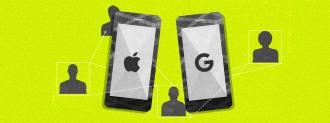Two of the biggest tech companies in the world are joining forces on a new coronavirus tracking project.
On April 10, Apple and Google announced that they were co-developing tech to support contact-tracking apps that trace people’s exposure to the novel coronavirus SARS-CoV-2 via their smartphones.
The pair hopes their coronavirus tracking project could help end the need for widespread COVID-19 lockdowns in a way that doesn’t infringe upon people’s privacy — a major criticism of many existing contact-tracing apps.
New Coronavirus Tracking Project
Contact tracing isn’t anything new, but using apps for the process is.
Traditionally, contact tracing involves a health professional asking an infected person to list everyone they may have exposed to a disease. They then manually alert all of those people to their exposure so that they can be tested.
This approach has been ineffective at tracking the coronavirus’ spread in most countries, however.
For one, it requires human resources that are currently in short supply — health professionals don’t have time to interview every person diagnosed with COVID-19 to find out who they might have exposed.
If 60% of a population used a contact-tracing app, it could end the need for lockdowns.
Even if they did, a person diagnosed with COVID-19 is unlikely to be able to provide accurate information on everyone they might’ve exposed to the disease. Since it’s so contagious, they’d need to be able to recount everyone they were in contact with in the last two weeks.
Automating this process through a contract-tracking app, then, is widely viewed as our best option for monitoring the coronavirus’ spread.
Several Asian nations have been using contact-tracing apps to monitor the spread of the novel coronavirus for weeks, and the approach is starting to catch on in other parts of the world.
While the specifics vary, most of these apps work in the same way, monitoring everywhere a person goes, typically through their smartphone’s GPS.
If an app user is diagnosed with COVID-19, they or a health worker can enter that information into the app, and it will alert everyone they recently crossed paths with about their potential exposure.
If 60% of a population used such an app, it could effectively end the need for widespread lockdowns, according to a recent study out of the University of Oxford.
“A contact-tracing app can…help ease us out of confinement,” lead author Christophe Fraser said in a news release.
“If we know we’ve not been in contact with anyone infected we can leave home safely, whilst still protecting our loved ones and avoiding a broader resurgence of coronavirus in our community,” he continued.
Improving Contact-Tracing Apps
Not everyone is in support of using contact-tracing apps to track the coronavirus, though.
Not only do they involve the monitoring of people’s movements, they also involve the sharing of private health information — major red flags for anyone concerned about government surveillance and data security.
In an attempt to address these concerns, Google and Apple are currently developing a way to use Bluetooth technology, not GPS, as part of their coronavirus tracking project.
According to the pair’s announcement, the tech they’re developing would allow smartphones in close proximity to one another to exchange anonymous key codes via a Bluetooth connection.
If a person tests positive for COVID-19, they can enter that information into an official public health app. The app would then send all the key codes their phone paired with over the last 14 days to a central database.
The app would be designed to regularly download this database of key codes and alert an owner if someone they’d recently paired with had been diagnosed with COVID-19.
The system wouldn’t record any location data or personally identifiable information.
“Privacy, transparency, and consent are of utmost importance in this effort…We will openly publish information about our work for others to analyze,” Apple and Google wrote in their joint announcement.
Ending the COVID-19 Lockdown
Apple and Google plan to launch their coronavirus tracking project in two phases.
In May, they’ll release an application programming interface (API) that ensures that third-party apps will be able to effectively track coronavirus infections between users of both iOS and Android smartphones.
We hope to harness the power of technology to accelerate the return of everyday life.
The second phase, which the companies say will launch “in the coming months,” will eliminate the need for apps to do the contact-tracing altogether — the tech will be built right into iOS and Android platforms and users could simply opt-in in their settings.
Nearly every smartphone in the world runs on either iOS or Android, so this collaboration between Apple and Google could set the stage for near-universal coronavirus tracking among smartphone owners — and bring an end to widespread lockdowns.
“Through close cooperation and collaboration with developers, governments, and public health providers, we hope to harness the power of technology to help countries around the world slow the spread of COVID-19 and accelerate the return of everyday life,” the companies wrote.






